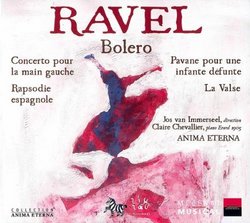More like 3.5 stars for execution; higher grade for being fi
Larry VanDeSande | Mason, Michigan United States | 07/24/2008
(4 out of 5 stars)
"After making the rounds in Europe for two years, this album -- which was selected as CD of the year by one English magazine in 2006 -- arrives in the U.S.A.
Jos von Immerseel and his band, Anima Eterna, have joined the league of heavyweights in period performance practice, having performed and recorded all the Beethoven and Mozart piano concertos, Schubert & Haydn symphonies and having dabbled in romantic repertoire such as Rimsky-Korsakov's Scheherazade, the Schubert symphonies, Lizst and Tchaikovsky's Symphony No. 4. They don't have the discography of Gardiner or Norrington but have closed the gap on these and other period practitioners when they released their inclusive set of Beethoven symphonies earlier this year.
This recording, dedicated to Ravel's popular orchestral music and his oddball piano concerto for a one-handed player, is the first known recording of Ravel using period instruments. Some people went ga-ga over this release and BBC Music Magazine cited it as its "Record of the year" for 2006.
It's not hard to understand why someone would be swept away with these goings on. Right from the opening notes of "Bolero", Immerseel lets us know we are in for something different. He holds down the relative volume most of the way through and allows every period player his or her moment in the sun. This is probably the first time I could clearly understand the nature of every instrument in the ascending line, including the saxophone.
Elsewhere, the musical experience is similar although I found Immerseel's approach more clinically objective than in his work with Mozart and Tchaikovsky. He often displays a distance from the score's emotional core I found unattractice, particularly in "Bolero" and "Rhapsodie Espanol". He seems more directly involved in "La Valse" which I believe is the best thing on the CD. He and Clare Chevallier collaborate winningly on the left-handed piano concerto with Chevallier playing a period instrument. They bring out its Shostakovian central movement well.
This is probably a more important release historically than musically, I'd say. Its release is important since it states the music, perhaps for the first time, in a langauge Ravel may have known in his day. The sound is outstanding and does much to further clarify Immerseel's already lucid and penetrating direction.
Emotionally, however, I have heard far better Ravel from many sources including arch-traditionalists. This CD does nothing to diminish the enjoyment I continue to receive from Ormandy's concert of most of these pieces, which can still be located on a Sony CD in America and elsewhere via Amazon search. It probably won't replace any of your favorites, either, but it will re-state them in a way you may not have heard."


 Track Listings (8) - Disc #1
Track Listings (8) - Disc #1